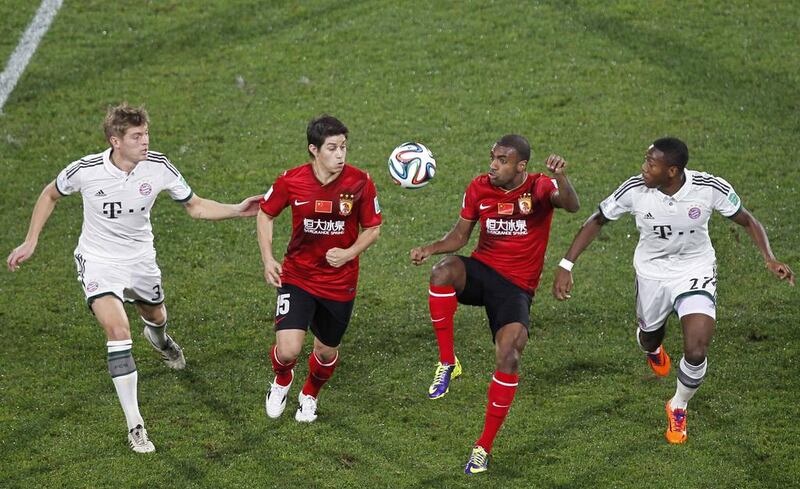Few expected it to be anything but a mismatch, and that is exactly what it turned out to be. It may have been billed as the Club World Cup semi-final, but in reality, European champions Bayern Munich and Asian champions Guangzhou Evergrande were as far apart in terms of quality as they are geographically.
The Chinese team’s 3-0 loss in Agadir was by no means an embarrassment, but the harsh truth is that matches between European and Asian opposition remain a forgone conclusion at this level.
“There you see the real difference between the best club in the world and the rest,” Guangzhou coach Marcello Lippi said.
The job done by Italy’s 2006 World Cup-winning coach since he took over at Guangzhou Evergrande last May should not be underestimated.
In 2013, FA Cup and Chinese Super League titles were secured, the latter for the third season in a row. Last month, Guangzhou Evergrande became the first Chinese team to win the Asian Champions League in its modern format, and only the second to claim the continent’s top club competition since Liaoning FC lifted the old Asian Club Championship in 1990.
That it is a massive achievement for Chinese football is not in question. But is it a portent of things to come, or an anomaly in a nation that has proven incredibly resistant to promoting team sports?
To better answer that, consider how sports development is approached in the world’s most-populous country. Some might argue that in a country of 1.4 billion, the talent pool should be big enough to provide enough footballers to make Chinese teams not simply competitive, but superpowers.
That is, of course, a simplistic argument that a cursory glance at the world’s best football nations would easily counteract. Of far more significance than population is the amount of money and resources a country is willing to infuse into a particular sport.
Traditionally, China have invested in individual sports more than team pursuits. At last year’s London Olympic Games, the country won 38 gold medals – 29 of them in individual sports.
The other nine medals were won in sports requiring only two athletes, in synchronised diving, table tennis and badminton. Football and basketball, both played by millions in China, were nowhere to be seen.
The preference for individual sports has political and cultural roots. It is hardly a secret that Chinese sporting authorities set a premium on accumulating as many medals as possible, whether at Olympic Games, world championships or Asian Games. Six successful divers might bring home six gold medals; 11 footballers can only win one.
Generally, this attitude is based on the old Soviet model, and has also been embraced by the likes of East Germany and Romania. Paradoxically for communist nations, individual success is valued more than a collective one.
At the 2000 Olympics in Sydney, China performed miserably, winning only one of 119 gold medals on offer. This led in 2001 to the creation of Project 119, an initiative targeting success in a host of minor sports to swell the number of medals at future Games, particularly Beijing 2008.
It served its purpose: China won 42 gold medals, more than any other nation.
The logic behind Project 119 is simple, if not infallible; the more medals the country is seen to have won, the better the state looks in the eyes of the world. China, where the number of athletes who play football and basketball comfortably exceeds whole populations of other countries, still follow that model.
Football in China has had to face other obstacles since the game turned professional in the early 1990s, the biggest being corruption.
Guangzhou were involved in a match-fixing scandal in 2009 and were relegated to China’s second division. It was only after Evergrande Real Estate Group invested heavily in the club that they got their house in order, promotion being followed by the three league titles and Lippi’s continental success.
Participation in the Club World Cup would only have whetted their appetite.
During a year in which China, not surprisingly, again failed to qualify for the World Cup, perhaps Guangzhou’s success will turn the tide for football.
They are a well-run club with serious financial investment, one of the world’s top coaches and a mixture of home-grown talent and South American stars.
Perhaps at last, this is a model to which Chinese football, and other team sports, can aspire.
akhaled@thenational.ae





